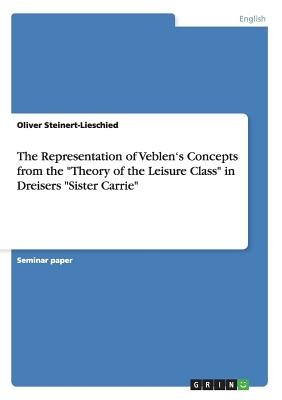
- We will send in 10–14 business days.
- Author: Oliver Steinert-Lieschied
- Publisher: GRIN Verlag
- ISBN-10: 3640562038
- ISBN-13: 9783640562039
- Format: 14.8 x 21 x 0.2 cm, softcover
- Language: English
- SAVE -10% with code: EXTRA
The Representation of Veblen's Concepts from the Theory of the Leisure Class in Dreisers Sister Carrie (e-book) (used book) | bookbook.eu
Reviews
Description
Seminar paper from the year 2006 in the subject American Studies - Literature, grade: 1,2, University of Göttingen, language: English, abstract: With his "Theory of the Leisure Class" (1899), which is nowadays considered one of his most popular works, Veblen made himself a social outsider because his criticism of society was harsh and provoking. Although he accepted utilitarianism and praised the industrial efficiency of the engineering professions, he rejected what Mills calls the American value of the "heraldry of the greenback" and the "pecuniary fanatism of the business chieftain". Still his work was widely read and many of the problems which he saw in contemporary American society are even nowadays still quite relevant. Dreiser's first successful novel "Sister Carrie" was written in 1900, only one year after Veblen's main work had been published. This fact, as well as the widespread interest in Veblen's theories throughout America may have influenced Dreiser at least indirectly. More important though, is whether there is some textual evidence to prove their agreements and disagreements concerning their critique of society. In contrast to Veblen, Dreiser did not have a solid educational background and was in fact "almost a generation behind the sweep of American intellectual life" (Noble, "Dreiser and Veblen and the Literature of Cultural Change"), so many of his explanations of human hehaviour were made in terms of "chemisms" (Noble 149). Dreiser at times tended to believe Spencer's theories of social-Darwinism and that man was not much more than a "machine" and mainly controlled by physical laws, while Veblen had rather moved beyond such notions (Noble 149). On a deeper level though, Noble considers the supposedly post-Spencerian Veblen to have unconsciously clinged to Spencer's belief in optimistic progressivism, while Dreiser had in fact transcended such notions and raised some doubts about the belief in inevitable and controlled progress in his works (Nobl
- Author: Oliver Steinert-Lieschied
- Publisher: GRIN Verlag
- ISBN-10: 3640562038
- ISBN-13: 9783640562039
- Format: 14.8 x 21 x 0.2 cm, softcover
- Language: English English
Seminar paper from the year 2006 in the subject American Studies - Literature, grade: 1,2, University of Göttingen, language: English, abstract: With his "Theory of the Leisure Class" (1899), which is nowadays considered one of his most popular works, Veblen made himself a social outsider because his criticism of society was harsh and provoking. Although he accepted utilitarianism and praised the industrial efficiency of the engineering professions, he rejected what Mills calls the American value of the "heraldry of the greenback" and the "pecuniary fanatism of the business chieftain". Still his work was widely read and many of the problems which he saw in contemporary American society are even nowadays still quite relevant. Dreiser's first successful novel "Sister Carrie" was written in 1900, only one year after Veblen's main work had been published. This fact, as well as the widespread interest in Veblen's theories throughout America may have influenced Dreiser at least indirectly. More important though, is whether there is some textual evidence to prove their agreements and disagreements concerning their critique of society. In contrast to Veblen, Dreiser did not have a solid educational background and was in fact "almost a generation behind the sweep of American intellectual life" (Noble, "Dreiser and Veblen and the Literature of Cultural Change"), so many of his explanations of human hehaviour were made in terms of "chemisms" (Noble 149). Dreiser at times tended to believe Spencer's theories of social-Darwinism and that man was not much more than a "machine" and mainly controlled by physical laws, while Veblen had rather moved beyond such notions (Noble 149). On a deeper level though, Noble considers the supposedly post-Spencerian Veblen to have unconsciously clinged to Spencer's belief in optimistic progressivism, while Dreiser had in fact transcended such notions and raised some doubts about the belief in inevitable and controlled progress in his works (Nobl


Reviews